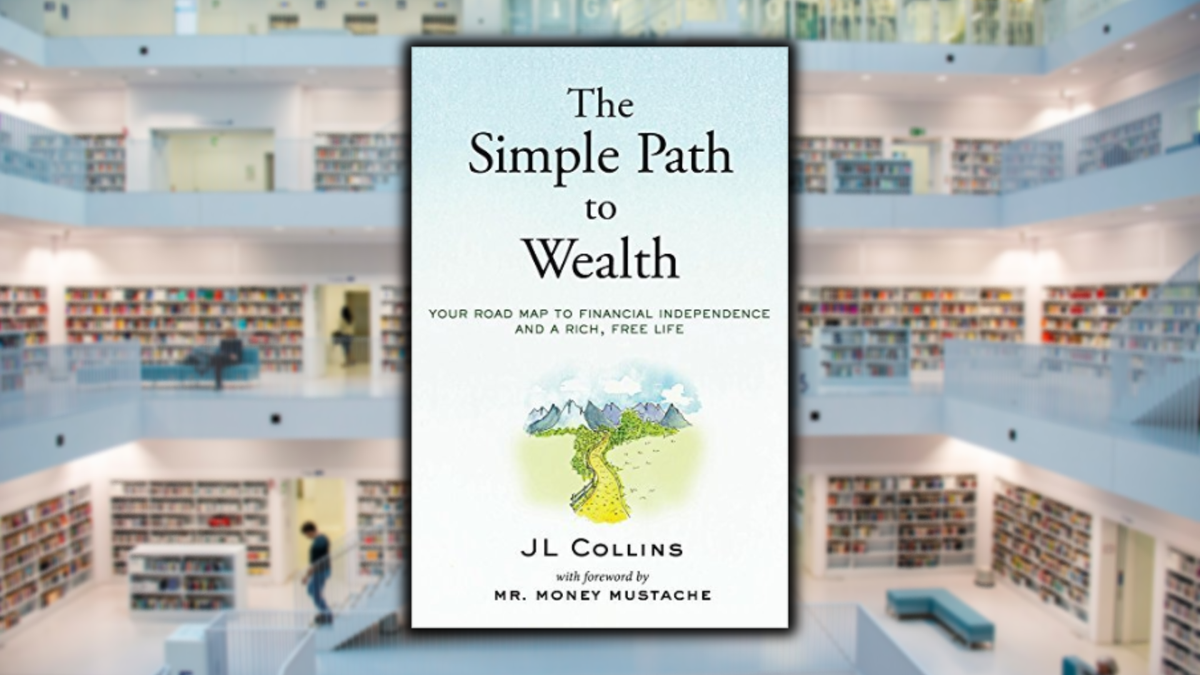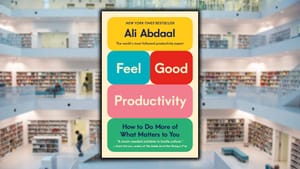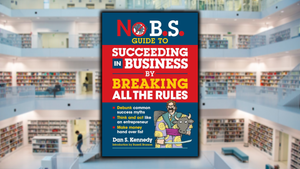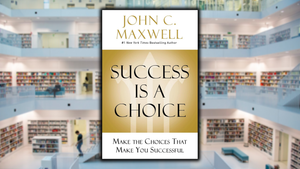This Book is For:
*People who aren't necessarily interested in becoming financial experts, and who just want a simple, proven plan that will lead them to financial independence and freedom as long as they just follow the steps.
*Young people who are just beginning to make their way in the world, maybe even about to receive their first big paycheck, and who need to learn about all the financial traps waiting for them - and opportunities available to them - before it's too late.
*Older adults who are starting to experience the reality of nearing retirement age, and who want to further fortify themselves against financial uncertainty by the time they get there - and for the rest of their lives after that.
*Anyone and everyone who is looking for a simple, timeless, nearly effortless investing strategy that has been proven to work across time and for all kinds of different people in various stages of life and circumstances.
Summary:
“Since money is the single most powerful tool we have for navigating this complex world we’ve created, understanding it is critical. If you choose to master it, money becomes a wonderful servant. If you don’t, it will surely master you.”
-JL Collins, The Simple Path to Wealth
There are approximately eight hundred gazillion books out there about investing, but this is one of the best ones. It also comes with an extremely easy-to-follow formula for building wealth over time:
Spend less than you earn. Invest the surplus. Avoid debt.
And that's pretty much it. The financial world is notoriously murky and opaque, and much of what goes on there appears to be random, but The Simple Path to Wealth cuts through all the noise and deception and gives you the straight facts.
It's also for people who don't want to invest a ton of time learning everything there is to know about money. Everybody wants financial security and freedom, but most people don't have any interest in becoming financial experts. This book bridges that gap beautifully.
Collins himself is a personal finance blogger who has built up an exceptionally loyal audience over the years, and in these pages, he comes across as an agendaless, effortlessly helpful neighbor who just wants you to succeed with money and be happy. The kind of guy who would invite you over for a barbeque and would actually make you want to go.
The Simple Path to Wealth goes a bit deeper into his personal philosophy as well, which is fundamentally about freedom. It's about getting this "money" thing handled, and thus expanding the possibilities for your own life.
Speaking of freedom, it strikes me that many people believe that their personal freedom is much further away than it actually is. JL Collins repeatedly dispels this myth on page after page, and by the end of it, you're left with this confidence, this inner knowing, that you can do this. You can earn your freedom. You can build wealth and reach financial independence, and it's not going to take you until the end of your days to do it.
Of course, freedom is far away if you choose to remain financially illiterate and don’t take time to learn how the stock market works, what the difference is between an index fund and a mutual fund, what an IRA is, and all this basic financial literacy stuff that he covers in this book. But more than that, Collins gives you the confidence that you can figure this stuff out; you can make meaningful changes to your financial strategy that will significantly improve your situation; you can do it, and thinking about money doesn't have to take over your whole life.
This book is extremely practical, and you'll learn what, specifically, to invest in (and to avoid) that will give you the greatest chance of building significant wealth over time. But the overall theme - the main takeaway - is that the stock market is the world's most powerful wealth-building tool, and, over a long-enough time horizon, it always goes up. Always.
The whole process of reaching financial independence involves five simple steps, which are as follows:
- Save Aggressively: This involves paying off most debt as soon as humanly possible, and, where it makes sense, aiming to save 50% or more of your pre-tax income. I know, I know, 50% is a lot. But we're going to discuss how 50% (or something close to it) is a lot more realistic than you might expect.
- Invest Strategically: You're going to have to decide for yourself how much risk you'd like to take on (which will determine your specific investment allocation, re: stocks vs. bonds, etc.), and then you're going to buy low-cost index funds such as Vanguard...and then hold them for decades.
Do not pull your money out of the market when stocks start to tank, as they almost inevitably will at least some of the time that you're invested in the stock market. Trying to time the market and pulling out when things get rough (and before the market inevitably recovers) is how people go broke. - Be Prepared: You're also going to want to keep some cash on hand for emergencies and to pay for various life events such as home renovations, car repairs, etc. Don't get caught off guard! When you prepare for them beforehand, big emergencies often turn into small inconveniences.
- Be Tax-Efficient: This is where the book is most valuable to U.S.-based readers and mind-numbingly boring to non-U.S. readers. But if you live in the United States, you're going to want to fill up all of your tax-advantaged accounts first, and this section will show you exactly how to do that. In the View from the Opposition section below, I link to similar resources for international readers.
- Don't Stop: That is until you can afford to live off 4% of your investment portfolio each year. It may take a while, but your wealth accumulation will speed up over time, especially if you're reinvesting the dividends from your investments along the way.
There are plenty of other topics discussed in the book, such as where traditional investing advice goes wrong and what actually works; the inner workings of the stock market and how to avoid being taken for a ride; how to change your investment strategy depending on which season of life you're currently in, how the market is faring, etc.; how fund managers are costing you literally thousands of dollars in extra fees; what financial independence actually looks like, and how to protect it, and so much more.
Most importantly, there's nothing in this book that's beyond your comprehension. You can learn everything you need to know to set yourself up for freedom and independence for life, and it doesn't have to consume your life.
You can spend just a few hours learning the basics of investing, money management, and finance, and then you can begin to apply them immediately to make your entire life better from this day forward. Very few investing books come with that kind of ROI.
See? ROI! We're starting to think like investors already!
Investing legend Warren Buffet once said that unless you figure out how to make money in your sleep, you're going to have to work until you die. The Simple Path to Wealth will help you do precisely that so that going forward, your finances don't limit your possibilities.
Financial independence means that you'll no longer be forced to make decisions based on how little money you have. Instead, the money you accumulate will support the life decisions you're able to make because of the freedom you have.

Key Ideas:
#1: Yes, it Really is That Simple
“Spend less than you earn—invest the surplus—avoid debt.”
It would be wrong to mistake "simple" for "easy," but Collins' recommended plan definitely works. It's extremely simple - almost too simple for some people's tastes - but I find that when you overcomplicate money and investing, that's where mistakes really start to creep in.
People try to get fancy (or lazy) and end up with a whole lot less money than they could have had if only they had followed the simple plan!
More on all of this later in this breakdown, but investing and saving for your future does not have to be complicated, and all it really comes down to is:
- Spend less than you earn.
- Invest the surplus.
- Avoid debt.
That's really it. People make money and investing so complicated (including certain financial predators we'll discuss later), and the rest of society often doesn't make it any simpler for them.
First, there is the tremendous social pressure exerted on you to keep up with the vacations and purchases of everyone else, even when you can't really afford them.
There are literally thousands and thousands of advertisements assaulting your eyes and ears every single day, all trying to convince you of the same idea: that you need this next, shiny, perfect thing before you'll ever feel complete. But that's a complicated lie.
I've said over and over again that I'm not "against" spending money on products and experiences that will make your life better. It's just that we tend to overvalue the positive contribution that these purchases will make to our quality of life.
Lazy thinking leads us to believe that if we just hand over our credit card this one more time that we'll be happy and complete forever, but again, that's just not true.
When you start to spend less than you earn, you'll begin to realize how possible financial independence actually is for you. JL Collins even advocates maintaining a 50% savings rate, which seems impossible, but when you begin to simplify your financial life, the path to get there begins to take shape.
There are actually two paths to increasing your savings rate, but the one we'll explore first is cutting your expenses. Generally, the largest expenses in anyone's budget are going to be their rent, their transportation, and their food. So basically, you need a box to live in, a cart of some kind to get you places, and some fuel for your body. Most of us can simplify so much in these areas!
First, I want to remind you of a quote by Naval Ravikant, where he says:
"Desire is a contract we make with ourselves to be unhappy until we get what we want."
Cutting your expenses is one path to increasing your available savings rate, but reducing your desires will also increase your happiness, making it even easier to live with fewer possessions and hence, fewer unnecessary bills. Wanting less will make it easier to live with less, to the point where you won't even notice it. You'll be just as happy as before, with the only difference being that you'll have a higher savings rate.
No one is talking about deprivation here. I'm not advocating making yourself miserable now, just so that you can save and invest for 50+ years and be happier at some distant point in time that may never arrive for you. Wheelchairs don't fit inside the trunks of Lamborghinis, and sacrificing the healthiest years of your life for some future that may never come just doesn't make sense.
What I am saying is that you don't need all that "stuff." You are a capable, resourceful, life-loving adult who is perfectly able to live a wonderful, joyous life without saddling yourself with worthless, meaningless, debilitating debt.
But back to the issue of cutting expenses. First, there's no shame at all in living with your parents or other family members while you're trying to build wealth, especially not if you get along fabulously with them! And I mean honestly, why on earth would you want to pay money just so you can be further away from the people you love? That's never made much sense to me.
Furthermore, if you're spending the majority of your time at work, at the gym, having (affordable) adventures out on the town with friends, etc., the amount of time you actually spend at home is going to be rather limited. And you'll be sleeping for most of that time anyway!
So although you do need to be comfortable where you live, and enjoy being at home, there's no need to bankrupt your future self by paying thousands and thousands of dollars in rent that you'll never see again.
Then there's the issue of transportation and food. For one thing, spending money on healthy food now will save you money later because of all the healthcare expenses you won't have to pay by not getting sick. So yes, I'm not against spending a little more money on great food, but again, you don't need to treat your friends to $400 dinners when you're trying to build wealth. Some of my absolute greatest memories involve eating shwarma on the streets of Russia with my friends, drinking $1 beers, and talking about life.
As for transportation, you don't have to spend a lot of money here either. If you live in the city, the public transportation system would probably suit you just fine. Plus, you get time to read or listen to audiobooks while you're sitting on the bus! Personally, I just bought a 20-year-old Porsche Boxster that I absolutely love. It "only " cost me $30,000 (more on the hidden costs of car ownership later), and the average person can't even tell that I didn't spend $90,000 on it. All they see is "Porsche" and think I must be rich. Life hack!
However you decide to limit your expenses, I will point out that there is a limit to how much you can cut, but virtually no limit to how much money you can make. It's beyond the scope of this breakdown to go into it fully, but you may want to read my breakdown of The 10 Pillars of Wealth, by Alex Becker for more on this.
Then comes the second step in Collins' stupidly simple yet super smart plan: investing the surplus! If by reducing your rent, transportation, and food costs, you're able to find even an extra $500-$1,000 a month, this is money that you can put to use immediately in becoming financially free.
Don't think of it as though you're depriving yourself in the present; instead, think of it like you're giving yourself freedom in the future. Actually, come to think of it, you're also giving yourself freedom in the present as well because you're freeing yourself from attachments to "stuff."
The third part of the simple path to wealth involves avoiding debt, which we'll talk about in the next Key Idea, but I just want to reiterate here that the modern world is literally designed to keep you a brain-fogged, unhealthy, broke, slave, and you need to resist this cultural poison with everything you have within you. In his book, Real Help, Ayodeji Awosika puts the matter bluntly:
“The politicians and media companies make you sad, angry, and depressed. When you're sad, angry, and depressed, you work out less and eat more. When you work out less and eat more, you get sick, and someone is there to provide the perfect pill to cure you just enough for you to go through the entire cycle all over again."
Collins is pretty clear on the debt issue himself, and I think you'll find that getting your head above water - financially, mentally, in every way - will be the difference between traveling the simple path to wealth in a golf cart or a Lamborghini.
#2: Debt Has No Place in Your Financial Life
“If you intend to achieve financial freedom, you are going to have to think differently. It starts by recognizing that debt should not be considered normal. It should be recognized as the vicious, pernicious destroyer of wealth-building potential it truly is. It has no place in your financial life.”
What if I told you that there’s somewhere you can legally put your money that will guarantee you a 16.22% (or more) rate of return?
Well, as Homer Simpson said to the security system salesman who asked him whether he could really put a price on his children’s lives, "I wouldn’t have thought so either, but here we are."
Jokes aside, all I'm really talking about here is a mental reframe you can make — and the accompanying actions you can take once you see things this way — that will put thousands of dollars right back into your pocket.
I’m talking about paying down your credit cards. ASAP. It’s not exactly what I would call “exciting,” but it’s 100% effective at saving you money.
According to Wealthsimple, the average annual return of the S&P 500 for the years 1957–2018 was about 7.96%. This is great, meaning that no matter what the market did in, say, 2008, you still would have made money.
But when you’re paying 16.22% interest on your credit cards (which is the average in the U.S.), it’s exactly like taking a 16.22% negative return on your money. Every year! Every. Single. Year.
Clearly, when you're stuck in a cycle of paying hundreds - if not thousands - of dollars every single month to pay down credit card debt, it makes wealth-building a whole lot more difficult. And that's not counting any other forms of debilitating debts such as student loans, which can literally follow you for life.
Debt is your worst enemy when it comes to building wealth for a lifetime, and according to JL Collins (and me too, actually), you have to do everything you can in your power to pay off your debts as fast as you can so that you can get on with the real business of living.
What Collins recommends is paying off all debt that comes with more than 5% interest before you even think about investing, but personally, I would advocate getting in the habit of investing, even if it's only with fairly small amounts at first.
For example, if you have $500 a month to use for debt repayments, I would suggest investing $100 or so in the stock market and using the rest to pay down your debt, just so you're building your investing muscles. This is going to be a personal choice, just like with all things money, but that's my $0.02.
If, however, it takes you 5 years to pay off all your debts before you're finally ready to start investing, and you don't learn much at all about the stock market during that time, you're suddenly going to be 5 years older and starting from the ground floor.
So even if it takes you, say, an additional 6 months to pay off all your debt using my method, you're going to have at least $6,600 invested at the end of those five years of debt repayments, at which point you'll also have a much better understanding of the stock market itself.
Technically, you'll have less money, but in my opinion you'll be a lot better off, because you'll be both debt free and knowledgable about the stock market, plus you'll have the $6,600 you've already invested!
Regardless of how you go about it though, debt is your enemy, and the banks are NOT your friends. The whole time you're paying interest on those credit cards and other debts, all you're doing is lining their pockets. They don't just hold your money, either! They lend out the money you give them, so they're basically making money off you twice, while you're still living paycheck to paycheck. Yea, I don't like banks.
If you stick to the plan, however, your debt won't last forever. Eventually, you'll pay it all off. You will. I believe you will. And at the end of it, that $500 a month you used to be spending on debt payments will be earning money in the stock market, rather than just flying straight into the vault of some bank. Then, the real financial fun begins for you.
#3: Investing is a Mind Game
“The market always recovers. Always. And, if someday it really doesn’t, no investment will be safe and none of this financial stuff will matter anyway.”
In The Psychology of Money, Morgan Housel says that doing well with money has a little to do with how smart you are and a lot to do with how you behave. It's not so much that we don't know what to do, it's about what happens in our head when we try to do it.
We all know what we need to do. This really is the blatantly obvious, stupidly simple guide to wealth we're talking about here. No one's reading Collins' book going, "Ohhhh, spend less than I earn! I never thought of that!" So we know what to do. But now we have to actually do it, and that's where most people stumble, even many very smart people.
To date, there's never been a 20-year period where the total U.S. stock market has lost money. Again, from The Psychology of Money:
“The historical odds of making money in U.S. markets are 50/50 over one-day periods, 68% in one-year periods, 88% in 10-year periods, and (so far) 100% in 20-year periods. Anything that keeps you in the game has a quantifiable advantage."
And yet multitudes of people go broke each and every year trying to pick winning stocks. Why is that?
Well, the answer is right there in the question, because trying to time the market is one of the most difficult things you could ever do. It's so difficult that virtually 0% of people are actually able to do it, and the ones who say they can are what Collins and I call f***ing liars.
Investing is primarily a mind game - it's perhaps one of the grandest experiments in human psychology ever conducted. The mental game is the one you have to win first, and the simple path to wealth only works if you avoid some of the major pitfalls that we've already discussed, such as racking up credit card debt, jumping in and out of the market, etc.
What Collins suggests is to disregard psychological comfort when setting your personal investment strategy. It's better, as he says, to adapt yourself and your attitudes to the numbers than to adapt the strategies you employ to your psychological comfort levels. Adopting the best strategy - buying index funds and holding them for 50+ years - isn't the most comfortable strategy; the stock market is a wild ride, and some years you'll be tempted to jump out in fear of losing everything.
But historically, the market always recovers, and you'll just make yourself sick if you check your portfolio 175 times a day, keeping track of all the ups and downs.
Sure, you can check your portfolio every few months maybe? Every two or three weeks if you're feeling brave. The occasional glance at the stock market news won't hurt too much. But just remember that the media companies attract eyeballs by telling people that the stocks are either going to the moon or that we're all f***ed and are going to be living on the street if we don't sell NOW.
If they say anything measured or nuanced or the least bit rational, their ratings will tank and they'll lose money. Remember this the next time you watch the news. Then, happily go about your day.
#4: The Opportunity Cost of Everything
“Stop thinking about what your money can buy. Start thinking about what your money can earn. And then think about what the money it earns can earn.”
Broke people think about the stuff that their money can buy. Rich people think about what their money can earn. And brilliant, psychologically well-adjusted rich people think about what the money their money earns can earn.
This leads us to a brief discussion of opportunity cost, which is something we all have to contend with in life. It's a subject I happen to find fascinating, but it can also be overwhelming, for reasons which will become clear soon enough.
Basically, every time you decide to do something, you're effectively not doing every single other thing that you could be doing instead. You can see already how thinking about stuff like this could drive a person insane! No wonder the existentialist philosophers are such a colorful group.
Anyway, for the purpose of our discussion here, when you invest in, say, Tesla stocks, you're not using that money to invest in a Vanguard index fund, or Apple stocks, or to buy bonds, etc. But in all of those cases, there's at least a possibility that you'll earn money over time. However, what about if you were to take that money and buy a car with it? What are the hidden opportunity costs of such a normal, commonplace decision like that?
Well, using a conservative rate of return of 8% per year, JL Collins comes up with the following scenario concerning the opportunity cost of car ownership:
“At 8%, $20,000 earns $1,600 per year. So your $20,000 car actually costs you $21,600. The original $20,000 plus the $1,600 it could have earned. But that’s just in the first year, and you are suffering this opportunity cost every year.
Over the 10 years you might own the car, that’s 10 x $1,600: $16,000. Now your $20,000 car is up to $36,000. That’s really understating things, however. We haven’t even considered what those annual $1,600 chunks could have been earning themselves. And what those earnings could then have been earning. And so on.
Should you not already be depressed enough about all this, remember that the $20,000 is gone forever and so is the $1,600 in lost earnings year after year with no end. At the end of the day, it’s one expensive damn car.”
#5: Sharks and Suckers
“Complex investments exist only to profit those who create and sell them. Further, not only are they more costly to the investor, they are less effective.”
I'll say first that there are financial advisors out there who do genuinely care about the people they serve, who actually do their absolute best to find people the best investments to buy, and who do perform "adequately" well when it comes to helping their clients achieve their financial goals.
However...
Generally speaking, the whole financial services game is to make the world of investing look so prohibitively intimidating and excessively complicated that people lose faith in their own ability to reason and then hand over a significant share of their potential profits to some dude in a cheap suit who basically does the same thing that JL Collins is teaching you to do in this book for yourself.
So yea, that's a pretty big "however"!
But it's just like Collins says himself: there's a lot of money to be made with actively managed funds...just not by the investors themselves.
Maybe the word "sharks" is a tad harsh, but not by much! And of course, you're not necessarily a "sucker" if you do choose to have a financial advisor manage your investments for you. All we're saying here is that it's not that difficult to do the legwork yourself, and you'll save a ton of money by doing so.
Many good, decent, trusting people look at the 1% management fees that a lot of fund managers charge, and they think, "Hey, that's not so bad! It's only 1%!" But over a 30 to 50-year timespan, that 1% adds up to some pretty insane amounts. How insane? Well, check out this investment fees calculator and see for yourself. It's actually pretty shocking, if you ask me, and definitely counterintuitive. 1% just doesn't seem like a lot! But it absolutely adds up.
Again, you're not necessarily a sucker if you go the actively managed route, but you're definitely leaving a significant amount of money on the table if you do.
One of the ideas behind this book is that most people don't want to become financial experts - they just want to know where to put their money so they can get back to the real business of living.
That's perfectly fine as far as it goes, but it would be a shame to give up potentially tens of thousands of dollars just to save yourself a few hours of reading. Especially if you didn't know that you did, in fact, have other options!
It's all about personal preference, of course, but what's easy shouldn't determine what you do. Your psychological comfort levels shouldn't determine your investment strategy, and I'd venture to say that you'd be a lot more comfortable with the extra tens of thousands of dollars in your pocket than you would be handing over that money to some "professional" who will never care about your financial future as much as you do.
#6: The 4% Rule
“Once 4% of your assets can cover your expenses, consider yourself financially independent. Put another way, financial independence = 25x your annual expenses.
That is, if you are living on $20,000, you have reached financial independence with $500,000 invested. If, like our friend Mike Tyson, you are living on $400,000 a month/$4.8 million a year, you’re going to need $120 million.”
If you make more than you spend, you'll always be rich. The 4% Rule has to do with calculating how much you need to have invested in order to stop working and to live off the interest that your investments generate.
Depending on who you are, your financial habits, and the basic structure of your life, your number will be different than other people's numbers. This is as it should be. Your situation will differ from mine (and from virtually everybody else's), and we all need to arrive at our own version of "enough."
In the quote above, there are a few things I'll have to expand on in order to give you more context surrounding this. First, the number 4% is based on the conservative assumption that your investments will grow at a rate of about 8% per year.
Obviously, some years in the stock market will be better or worse than others, but it's been a reliable, reproducible finding over time that withdrawing at 4% per year works for most people.
The "rule" was first developed in 1988 (and updated in 2009) by three professors who ran computer simulations to test the impact of different percentage withdrawal rates on various portfolios over a 30-year period. Over that 30-year period, the researchers found that a portfolio split 50-50 between stocks and bonds, with a 4% withdrawal rate adjusted for inflation, remained stable 96% of the time.
To make the rule more concrete, you can imagine that you've calculated your yearly living expenses to be about $100,000. That's a lot of money to some people in some places, and not very much at all to other people with different lifestyles and in different countries. But if you multiply that number by 25, you get $2,500,000, and if you assume a 4% yearly gain, you reach $2,600,00, meaning that you can withdraw $100,000 for your living expenses without even touching the principal. That's the 4% Rule.
You can do all the calculations yourself (and I highly recommend that you do!) and you'll see that there is an actual number that you can shoot for that, once reached, will allow you to live in relative freedom and security for the rest of your natural life. This is powerful information to know!
One of the traps laying in wait for you, however, is that of lifestyle inflation, whereby your living expenses keep going up and up to match your increased income. If you fall prey to lifestyle inflation, it will never matter how much money you make, because it will never be enough.
So now you have a concrete goal, and the task ahead of you is to organize your entire financial life so that you're moving inexorably towards that goal with everything you do. As Charlie Munger said, that first $100,000 is a bitch, but you'll also have the power of compounding working in your favor too, as long as you remain focused on the goal and keep contributing to your investment account.
Obviously, nothing in life is guaranteed, and once you do reach financial independence, it's not like all your troubles will be over and you'll live in perfect bliss and total satisfaction for the rest of your life. Life is change, uncertainty, movement, and transformation. But as JL Collins says (and even he's being more careful here):
“Withdrawing 3% or less annually is as near a sure bet as anything in this life can be.”
#7: You Are Only Limited by Your Imagination and Your Fears
“Personally, there is nothing I’d rather buy or own than F-You Money. With it, the world’s possibilities are endless and you are faced with the delicious decision as to what to do with your freedom. The only limits are your imagination and your fears.”
People spend so much money trying to become happier and more fulfilled - as if there were something one could buy that could ever give you as much peace as being free will give you.
Life can be free and beautiful - a wonderful adventure! I ripped that off Charlie Chaplin, but it's true! Once we get our money situation handled, the rest of life opens up to us, and the rest of life is huge. There's way too much to see and do and experience to waste your one and only life making payments on shit you didn't even need to buy in the first place.
What I recommend putting together - and Nassim Taleb and JL Collins back me up on this - is FU money. Nassim Taleb once said:
“You are free in inverse proportion to the number of people to whom you can't say 'fuck you.' But you are honorable in proportion to the number of people to whom you can say 'fuck you' with impunity but don't."
Once you have enough FU money, you'll almost never have to do anything you don't want to do, and you'll have time and space for the things you love to do, that you can't wait to do, that you could never imagine not doing! There's nothing that you could possibly buy or own that will add more to your happiness than that will.
Yet, freedom comes with its own challenges. To become free is everything, but living in a state of freedom comes with confusion, fear, and doubt. If you're free to do everything, it becomes difficult to do anything. And for some people, they'd rather remain slaves, than deal with the paralyzing uncertainty that accompanies freedom.
The fear of success is real, and I've dealt with something like that in my own life. For some people, working a job that's beneath their capabilities is all they know; being in debt is "comfortable;" and when they think ahead to the larger questions about life that they'll have to answer when they break free, it seems to them that it's easier to remain a slave.
But it doesn't have to be this way. You can be different. You can confront the fears or doubts you have when it comes to what you do after financial slavery, and you can embrace the total possibilities of your personal freedom.
You now have a simple path to follow. You have a proven plan. You've run the numbers, you've made all the calculations and the adjustments, and now you're ready to take action, to outrun your fears and your paralysis, and engage the full power of your imagination. You're on the way to having FU money, and that feels f***ing amazing.
Of course, you don't actually have to say "F*** you" to anyone. It's more of an attitude, a belief system, a way of being in the world. It's a way of life and one that's made possible by following the simple path to wealth.
Living a free, fantastic, financially independent life is far more achievable - and far less costly - than most people realize, and it's more worthwhile and intoxicating than most people can even imagine.

Book Notes:
“Two close boyhood friends grow up and go their separate ways. One becomes a humble monk, the other a rich and powerful minister to the king.
Years later they meet. As they catch up, the portly minister (in his fine robes) takes pity on the thin and shabby monk. Seeking to help, he says: ‘You know, if you could learn to cater to the king, you wouldn’t have to live on rice and beans.’
To which the monk replies: ‘If you could learn to live on rice and beans, you wouldn’t have to cater to the king.’
Most of us fall somewhere between the two. As for me, it is better to be closer to the monk.”
“It was my first ‘professional’ job and it had taken me two long post-college years supporting myself doing minimum wage grunt work to find it. But I wanted to travel. I wanted to spend a few months bumming around Europe.
I went to my boss and asked for four months of unpaid leave. Such a thing was unheard of in those days. He said ‘no.’ Back then I had no idea that working relationships were negotiable. You asked. Your employer decided and answered. Done.
I went home and spent a week or so thinking about it. In the end, as much as I liked the job and as tough as I assumed finding another would be, I resigned. I wanted to go to Europe. Then a funny thing happened. My boss said, ‘Don’t do anything rash. Let me talk to the owner.’
When the dust settled, we agreed on a six-week leave which I spent riding my bicycle around Ireland and Wales.
While I might not have initially realized such things could be negotiated, I learned quickly enough. I asked for and received a month of annual vacation going forward. That got me to Greece the following year. My eyes were opened. F-You Money not only paid for the trip, it bought me room to negotiate. I’d never be a slave again.”
“It’s a big beautiful world out there. Money is a small part of it. But F-You Money buys you the freedom, resources, and time to explore it on your own terms. Retired or not. Enjoy your journey.”
“The more and greater things you allow in your life, the more of your time, money, and life energy they demand.”
“Flexibility. How willing and able are you to adjust your spending? Can you tighten your belt if needed? Are you willing to move to a less expensive part of the country? Of the world? Are you able to return to work? Create additional sources of income? The more rigid your lifestyle requirements, the less risk you can handle.”
“Fast-forward to 2010-14, my daughter’s college years. The all-in yearly cost averaged $40,000 at the University of Rhode Island, also a state school. New York University, her other option, would have run ~$60,000 per year.
As a former colleague of mine once said, that’s like buying a new BMW, driving it for a year, and throwing it away. Then buying another. For four consecutive years.”
“Unlike other kinds of debt, as truly awful as they are, you can never walk away from your student loans. They survive bankruptcy. They will follow you to your grave. Your wages, and even Social Security, can be garnished to pay them. No wonder banks are falling all over themselves to issue this debt.
I am a firm believer in personal responsibility and that debt freely taken on should be faithfully repaid. But the ethics of encouraging 17 and 18-year-olds – who likely have little financial savvy – to almost automatically accept this burden give me serious pause. We have created a generation of indentured servants. It’s hard to see the ethics or benefits in that.”
“I owned my freedom. Freedom to choose when to leave a job and freedom from worry when the choice wasn’t mine.”
“The lines between need and want are continually and intentionally blurred.”
“What the media wants from these commentators is drama. Nobody is going to sit glued to their TV while some rational person talks about long-term investing. But get somebody to promise the Dow is going to 20,000 by year’s end or better yet, is on the verge of careening into the abyss, and brother you’ve got ratings!”
“It’s your money and nobody will care for it better than you. But many will try hard to make it theirs. Don’t let it happen.”
“With less effort than choosing an advisor, you can learn to manage your money yourself, with far less cost and better results.”
“Mr. Buffet talks in terms of owning the businesses in which he invests. Sometimes he owns them in part – as shares – and sometimes in their entirety.
When the share price of one of his businesses drops, what he knows on a deep emotional level is that he still owns precisely the same amount of that company.
As long as the company is sound, the fluctuations in its stock price are fairly inconsequential. They will rise and fall in the short term, but good companies earn real money along the way, and in doing so their value rises relentlessly over time.”
“The Dow started the last century at 66 and ended at 11,400. How could you lose money during a period like that? A lot of people did because they tried to dance in and out.”
-Warren Buffet
“Wisdom comes from experience. Experience is often a result of lack of wisdom.”
-Terry Pratchett
“Money frees you from doing things you dislike. Since I dislike doing nearly everything, money is handy.”
-Groucho Marx
“As individuals, we only have one obligation to society: To ensure we, and our children, are not a burden to others. The rest is our personal choice. Make your own, and make the world a far more interesting place.”
“Everything you want is on the other side of fear.”
-Jack Canfield
“Avoid debt. Nothing is worth paying interest to own.”
“You’re young, smart, healthy, and tough. By your thirties, you’ll have F-You Money and you should have a blast getting there. Once you’ve got it, it will continue to expand, as will your personal options. Your future is so bright it hurts my eyes to look at it. That’s what I have told and will continue to tell my daughter.
So, if you are also in college, or a few years out, and wanted to know what your kindly old Uncle Jim suggests, there you have it. Like everything we’ve discussed, it is all about expanding your opportunities in life.
If you are a bit more seasoned, don’t despair. It’s never too late. It took me decades to figure this stuff out. Like mine, your road has likely already had more bumps than those who follow this path from the start will endure. But those bumps are in the past.
It is your future that matters and that starts, for all of us, right now.”

Important Insights from Related Books:
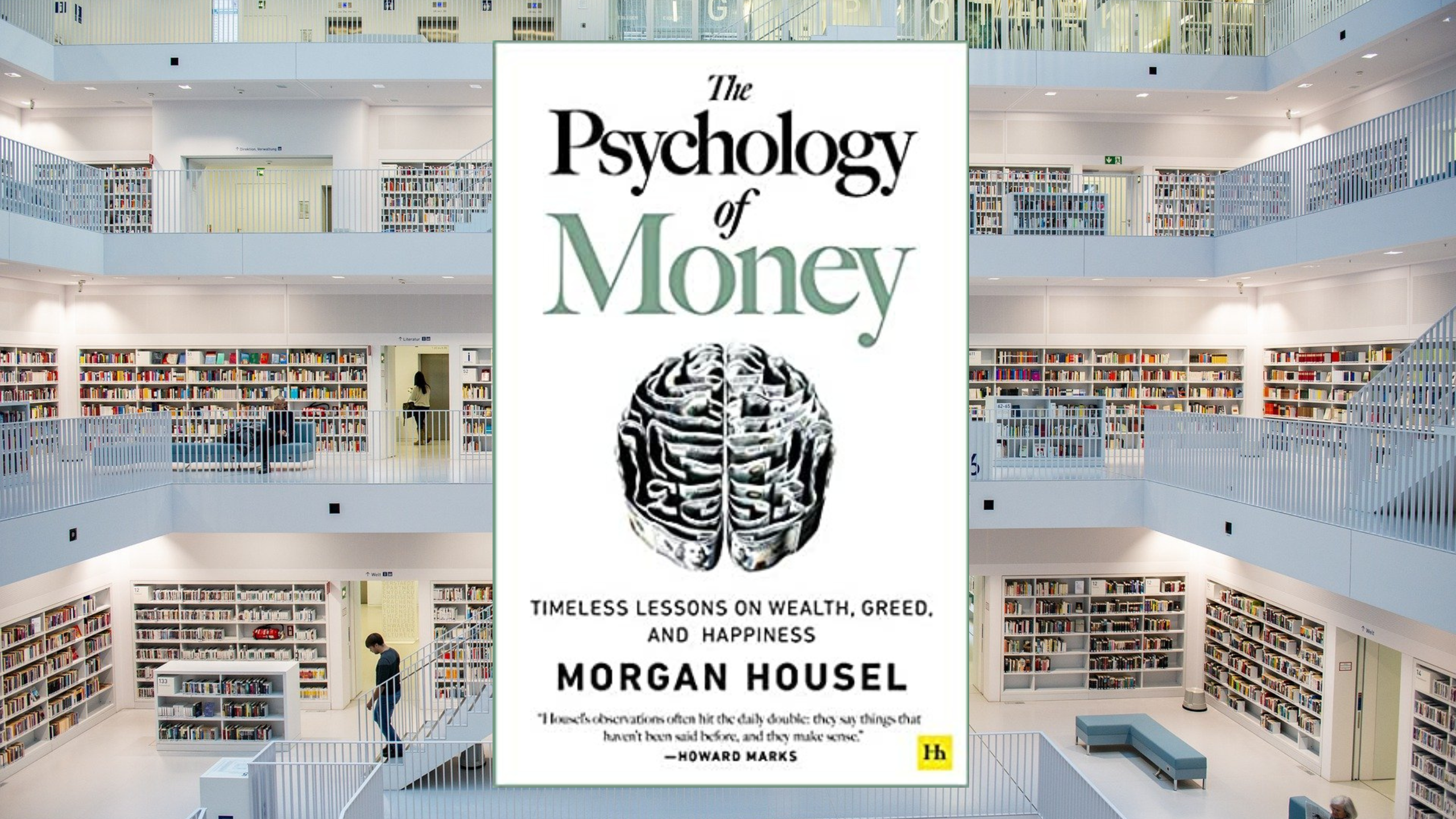
The Psychology of Money, by Morgan Housel:
Doing well with money has a little to do with how smart you are and a lot to do with how you behave. Exploring exactly how this plays out in real life is Morgan Housel's project here, and in this book, he covers 20 of the most important logical flaws, biases, and causes of bad behavior that do the most to make the world of money such a circus.
One of his greatest observations is that knowing what to do tells you nothing about what happens in your head when you actually try to do it, and he also explains why people make decisions with money that may seem crazy to us but actually make perfect sense to them. No one is crazy, says Housel, it's just that we've each learned different lessons about money depending on our worldview, how we were brought up, and the individual experiences we've had.
In this breakdown, we're going to be looking at why gaining control over your time is one of the highest dividends money can pay, and the parts that luck and risk play in the formation of our strategies for life.
We're also going to be working on making you "antifragile" by making sure you eliminate any single points of failure that currently exist in your life, and I'm going to be introducing you to one of the most effective investment strategies ever devised, otherwise called "Shut Up and Wait."
Sample Quotes from the Book:
“People from different generations, raised by different parents who earned different incomes and held different values, in different parts of the world, born into different economies, experiencing different job markets with different incentives and different degrees of luck, learn very different lessons."
“None of the 2,000 books picking apart Buffet's success are titled This Guy Has Been Investing Consistently for Three-Quarters of a Century. But we know that's the key to the majority of his success. It's just hard to wrap your head around that math because it's not intuitive.
There are books on economic cycles, trading strategies, and sector bets. But the most powerful and important book should be called Shut Up and Wait. It's just one page with a long-term chart of economic growth."
“The hardest financial skill is getting the goalpost to stop moving.”
Read the Full Breakdown: The Psychology of Money, by Morgan Housel
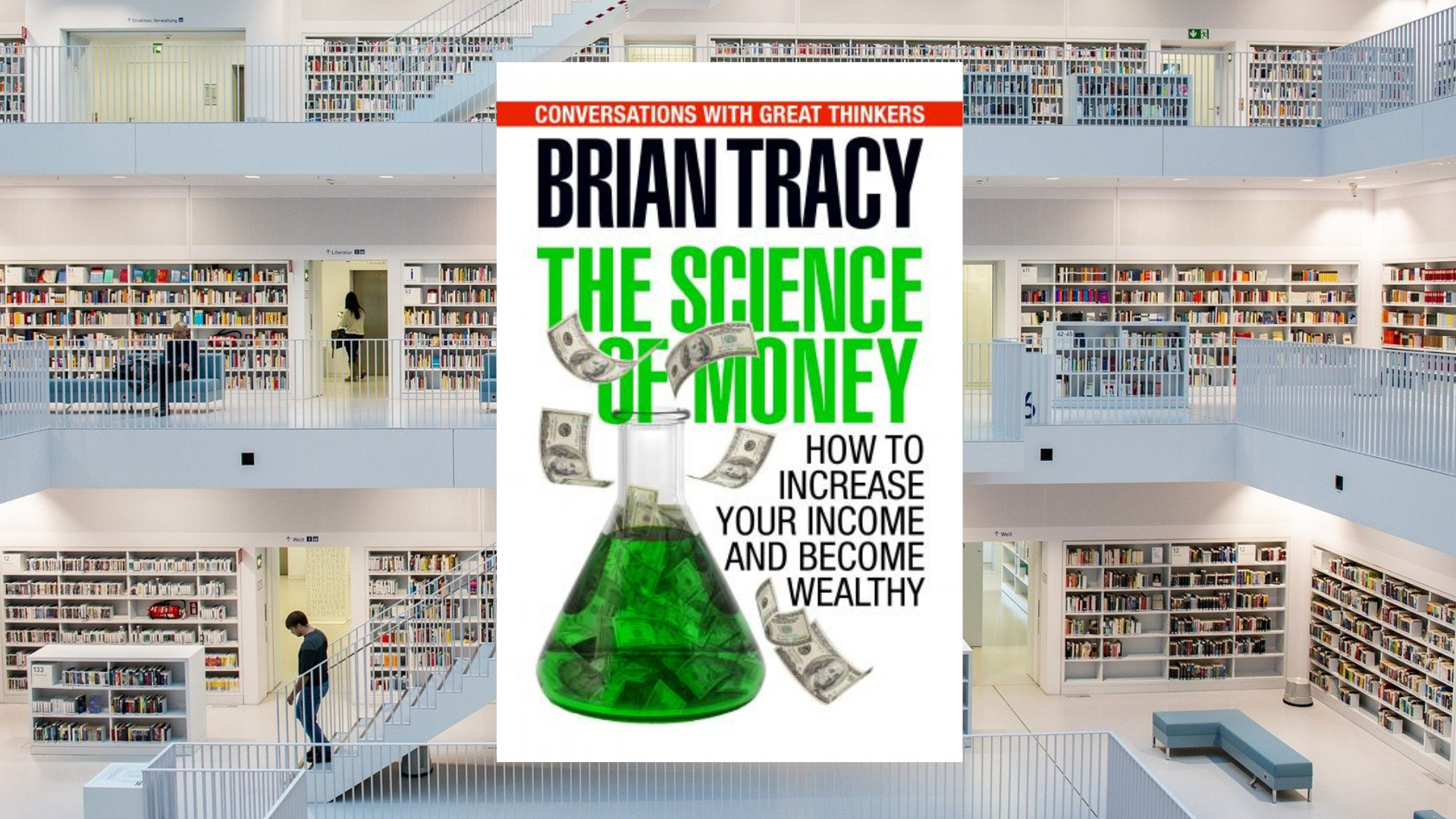
The Science of Money, by Brian Tracy:
“Successful people are always looking for opportunities to help others.
Unsuccessful people are always asking, 'What's in it for me?'”
-Brian Tracy
You can get virtually anything you want in life, just as long as you help enough other people get what they want.
That's one of the earliest lessons I learned from one of the first self-improvement books I've ever read, and Brian Tracy has been a staple of my wide reading ever since. The truth of his principles has been proven time and time again, and in my own life, much of my success can be directly attributed to what I've learned from him.
In this book, The Science of Money, Brian breaks down some of the myths and misconceptions concerning how money works and how to bring more of it into your life, as well as provides enlightening explanations of the ideas that will help you create wealth. Perhaps "science" is too strong a word - there's certainly a softer, more human element to wealth creation, too - but these ideas are solid.
Importantly, the ideas in this book are foundational. They will help you to start your journey to riches on the right foot.
There's a ton of misinformation, bad advice, and downright lies that are propagated today when it comes to making money, but you'll find none of them here. And even if you're a little further along on your journey, you'll find that this book is an excellent refresher and one that you may want to keep close by.
There are a ton of great ideas contained here in this breakdown, such as the vital importance of investing in yourself, a discussion about identifying infinite opportunities, and advice about how to increase your earning capacity, but I will just say this: if you bring these ideas to your life through your daily actions and activities, your financial life will change for the better. It will improve.
The world is getting richer all the time; the principles of wealth creation are known; you are more capable than you know, and Brian Tracy's hard-won wisdom is available to all who seek it at the foot of the Stairway to Wisdom.
Sample Quotes from the Book:
“If you invest in yourself, you own 100% of the investment forever. You get 100% of the return.”
“As long as there are human wants unfulfilled and human problems unsolved and human needs that have not been taken care of, there will always be opportunities for the creative minority.”
“What is the amount that you need to reach in assets and cash flow, monthly and annually, so that you can stop? Self-made millionaires spend a good deal of time thinking about the answer to this question: how much will I need in order to be able to support the lifestyle I desire, and what will I do then?
Then they focus on that, and they sacrifice a lot in the short term in order to finally accumulate that amount of net worth, yielding that amount of income, so that they are free, their family is free, their children are free.
They’re not going to stop working, but that’s the crossover point. At that point they can get involved in philanthropy and in other activities and cut back. But for the first part of your life, you must put your whole heart into becoming financially free, and you must do it when you have the highest amount of energy, drive, ambition, and opportunity.”
Read the Full Breakdown: The Science of Money, by Brian Tracy

The 10 Pillars of Wealth, by Alex Becker:
Most people aren't wealthy. They may or may not be struggling financially, but the average person will never become rich, and this is because it's literally impossible both to remain average and make above-average money at the same time.
You must elevate your financial game if you wish to become wealthy, and that process starts with embracing the mindsets and thinking patterns of the world's wealthiest people.
Now, obviously, there's a huge difference between a person's value to society and their value to humanity itself. Each and every individual's value to humanity is literally infinite - there are no "extra" people on this planet. But your value to society is what directly affects what you get paid, and the amount of wealth you can accrue in your lifetime.
If you want to be rich, you must make yourself exceptionally valuable to society.
Sample Quotes from the Book:
“By wanting to become wealthy, you are also saying that you want to accept the challenge to be better at making money than 99 percent of the people on this planet.
Just by attempting this, you are going to have to accept the fact that you must not just be good, you must be incredible. If you think differently, then you are done before you even get started."
“It might take you ten years, but if you never give up, you will have something to show for it.”
“It is VERY hard to spend $5 million every year.”
Read the Full Breakdown: The 10 Pillars of Wealth, by Alex Becker
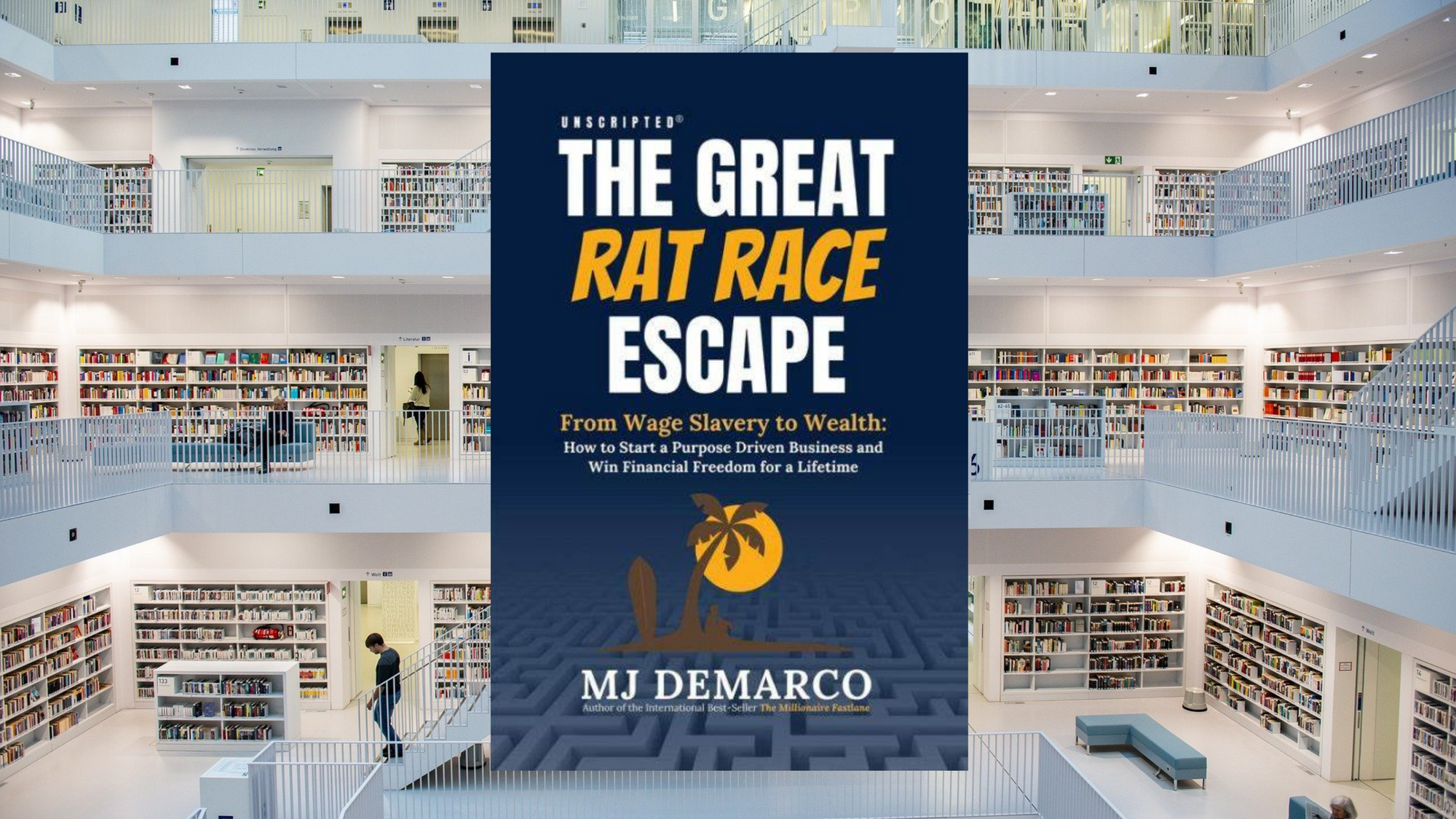
The Great Rat Race Escape, by MJ DeMarco:
An extraordinary life is won on offense and then preserved on defense. This book is about increasing your offensive capacity - and, specifically, about creating an income that will enable you to live free forever - while avoiding the mistakes and pitfalls that derail so many other well-intentioned people as they try to make a big move forward in life.
The Great Rat Race Escape blasphemes against the current “economic religion” of the world, which tries to convince people that they “wouldn’t be too unhappy” working away for 40+ years at a job that they “kinda-sorta like” (or, in many cases, passionately loathe), just so they can maybe - hopefully - get their freedom back fifty years later when they can finally enjoy their money from the safety of the nursing home.
That sounds like a waste of a perfectly joyous life to me, and M.J. DeMarco teaches how we can avoid that fate by starting a business and taking advantage of the internet gold rush that we’re currently experiencing. The creator economy is absolutely booming right now, new businesses are appearing all the time, entrepreneurship is “hot,” and our time is now.
Sample Quotes from the Book:
“If the crowd knew any better, they wouldn’t be two paychecks from broke and wasting their life in front of a television.”
“Our culture thrives on mediocrity and obedience. It is the world’s business model.”
“Never live within the parameters of someone else’s opinion unless you want to live within the parameters of their existence.”
Read the Full Breakdown: The Great Rat Race Escape, by MJ DeMarco

The View from the Opposition:
No one's ideas are beyond questioning. In this section, I argue the case for the opposition and raise some points you might wish to evaluate for yourself while reading this book.
#1: The Simple Path to Wealth is the Slow Lane
Wheelchairs don't fit inside the trunks of Lamborghinis. That is to say, investing is a long-term game, but life is lived immediately, right now. So there's a balance that needs to be struck between living a good life today and investing for an even better life tomorrow.
The Simple Path to Wealth would be an example of what entrepreneur MJ DeMarco calls "slow lane" thinking, as opposed to the "fast lane," which might involve starting a business that allows you to reach financial independence in, say, 5-10 years, instead of investing in index funds for five decades until you're too old to enjoy the fruits of your labors.
There's nothing "wrong" with either approach, but whichever choice we make, we need to go into it with both eyes open, aware of our options, and what our choices mean for the road ahead.
#2: International Readers May Want to Skip Whole Sections
Everyone who handles money in their lives can benefit from reading this book, however, JL Collins is American, and he's writing for American readers, which is why he'll often reference investment vehicles like Roth IRAs and the like that have different names - or don't exist - in other countries.
That's not a criticism of the book, it's just to say that you may want to know that going in. Anyone who's planning on investing in American stocks and bonds will also likely benefit from reading the book, but again, whole sections of the book will be most useful to readers based in the U.S.
That being said, I did stumble upon the website Bankersonwheels, which is quickly establishing itself as a leading Investing and Personal Finance website for Global Investors that invest through European and UK Investment platforms and products.
They have their own summary of The Simple Path to Wealth, and the following is an excerpt from their summary aimed at European readers:
"As a next step, you will need to cover specifics related to European Personal Finance, including European tax regimes, tax wrappers, etc.
Finally, investing in Europe is a bit more involved and this part is clearly missing.
For instance, we wouldn’t advise Europeans to buy US-centric Index Funds, but rather a mix of a World ETF and a Global Bond ETF.
Or you could consider a Vanguard ETF that simply combines the two – it’s quite easy! But it won’t take you more than a week to understand all the aspects to apply JL Colins’ principles to our European investing landscape."
"The test of a first-rate intelligence is the ability to hold two opposed ideas in the mind at the same time and still retain the ability to function.”
-F. Scott Fitzgerald

Questions to Stimulate Your Thinking:
The quality of your questions determines the quality of your life. That's also how you get the absolute most out of any book that you decide to read:
You ask great questions the whole time - as though the book was on trial for its life.
Here in this section are a few questions that can help guide and stimulate your thinking, but try to come up with your own additional questions, especially if you decide to read this book the whole way through...
#1: "What investment stage are you in right now? Are you in the wealth accumulation stage or the wealth preservation stage? Some mix of the two?"
#2: "What level of risk are you comfortable with? What kind of asset allocation is going to enable you to sleep at night while maximizing the chances of reaching your financial goals?"
#3: "Is investing talked about in your family? Or is it a subject to be avoided? Do you have anyone you can talk to about money matters?"
#4: "How much of your debt do you regret taking on in the first place? Can you change your relationship to debt so that you see it as the enemy of wealth accumulation that it is?"
#5: How much does your dream life actually cost? Have you ever taken the time to calculate it? Were you surprised?"
"Judge a man by his questions, rather than by his answers."
-Voltaire

Action Steps:
So you've finished reading. What do you do now?
Reading for pleasure is great, and I wholeheartedly support it. However, I am intensely practical when I'm reading for a particular purpose. I want a result. I want to take what I've learned and apply it to my one and only life to make it better!
Because that's really what the Great Books all say. They all say: "You must change your life!" So here, below, are some suggestions for how you can apply the wisdom found in this breakdown to improve your actual life.
Please commit to taking massive action on this immediately! Acting on what you've learned here today will also help you solidify it in your long-term memory. So there's a double benefit! Let's begin...
#1: Before You Do Anything...
In her excellent time-management book, 168 Hours, Laura Vanderkam writes that the best way to gain control over our time is to figure out how we're spending it now. We can take a similar approach to our finances!
So before we do anything else, it's a good idea to figure out where we are now with our finances - what our situation is, and what our options are. This means making some sort of budget, taking into account your lifestyle, cost of living, any assets or liabilities you have...that sort of thing.
Then, it may be a good idea for you to calculate how much you'd need to have invested to be able to maintain your ideal lifestyle by withdrawing 4% per year from your investments. As discussed above, if you want to live on $100,000 per year, that means having $2,500,000 invested in the stock market and living off the interest.
#2: Destroy Debilitating Debt
Debt has no place in your financial life! JL Collins says that repeatedly, I say it repeatedly...so yea!
Sometimes it's more or less unavoidable, or at least understandable, as in the case of taking on student loans or buying a car, but it's that mindless consumer spending that leads a lot of people into debt trouble, and that's the kind that needs to be ruthlessly eliminated from your life if you want to give yourself the best odds of becoming financially free.
There are two popular methods for eliminating debt, and the first is to address the loan with the highest interest rate and pay that off first. Mathematically, that's the best option, because you're paying down the principal and reducing your interest payments along the way.
However, other people have success with something called the snowball method, where you take the smallest debt balance and pay that off first. The thinking behind this is that if you have multiple smaller loans all competing for your attention, it makes it difficult to get a handle on everything psychologically.
If you take out those smaller balances first, putting every single dollar you have into paying off that smallest amount, you'll build up momentum, and you'll be able to move on to the next highest balance, and so on until you're completely debt free.
The choice is up to you, but the important thing is that you get this situation handled once and for all.
#3: Make Your First Deposit
Getting in the habit of investing is so incredibly important. That's why this Action Step is simply to open an investment account and deposit your first $10.
Earning 8% interest on $10 is almost literally nothing, but it's NOT nothing, because you're getting started. You're moving down the path, and that's something to be celebrated.
Depositing just $10 a month is $120 in 1 year (if my math serves me correctly!), but as you keep eliminating your debt and working to make more money, the amount you'll be able to deposit will keep rising as well, until you're able to start getting into triple digits and even higher!
The important thing is that you just don't stop. You can even set it up so that a certain amount is invested automatically each month so that you don't even have to think about it!
Eventually, you'll look back and realize that you are an investor. You've armed yourself with the requisite knowledge, and taken the appropriate steps, and you're now destined for financial independence.
"The path to success is to take massive, determined action."
-Tony Robbins


About the Author:
These days, I'm a book author and financial blogger on jlcollinsnh.com, but it wasn't always so. I started selling flyswatters door-to-door and picking up empty pop bottles from the side of the road for the 2-cent deposit. Gimme a break. I was eight. My first real job was scrubbing out big metal ice cream cans. I was 13. It paid $1.25 per hour.
From there: Busboy, dishwasher, order-puller, grocery bagger, stock clerk, produce clerk and gas station pump jockey back in the day when someone pumped your gas, washed your windows and checked your oil (ask your grandparents). Mail clerk, tree-trimmer, landscaper, ad agency founder, account executive, ad space salesman, investment officer, entrepreneur, consultant, sales trainer, speaker, writer, radio talk show host and magazine publisher. Pretty much in that order although I've done some more than once. And I may have forgotten one or two.
My work has taken me to most U.S. states as well as Canada, Germany and England. One of my few regrets is that I've never had an international posting. But I've had the good fortune to see a bit of the planet on my own: Mexico, Canada, Ireland, Wales, England, Greece, Crete, Puerto Rico, Tahiti, Venezuela, Curacao, Scotland, Italy, Germany, Spain, Paris, India, Kashmir, Goa, Nepal, Zanzibar, Tanzania, Eleuthera, St. Thomas, St. Martin, Barbados, Antigua, Martinique, Ecuador, Perú, Bolivia, Chile, Prague, Guatemala, Galápagos. Pretty much in that order although I've visited some more than once. And I may have forgotten one or two.
I've traveled by plane, train, bus, boat, subway, taxi, hired car, motorcycle, bicycle, rickshaw, hitch-hiking, foot, horse, donkey and elephant. Not only traveled by elephant, but herded rhinoceroses by elephant back in Nepal. My degree in English Lit is from the University of Illinois at Champaign-Urbana. They still send me alumni letters mostly, I think, hoping I've become rich and famous. I'm working on it.
Here's my favorite cartoon: The visual is two guys in a corn field, up on racks dressed in shabby clothes. Straw coming out from their shirt cuffs and pant legs. They are serving as scarecrows. One is looking over at the other and saying... "English Major. How about you?"
A pal of mine once said I had won the family lottery. He is right. My wife Jane and I have been married for 34 years. Our daughter Jessica graduated Summa Cum Laude from the University of Rhode Island. She currently serves in the Peace Corps.
Additional Resources:
The Position of F*** You, bu JL Collins (Explicit, Obviously)
This Book on Amazon:
The Simple Path to Wealth, by JL Collins
If You Liked This Book:
The Psychology of Money, by Morgan Housel
The Science of Money, by Brian Tracy
The 10 Pillars of Wealth, by Alex Becker
The Great Rat Race Escape, by MJ DeMarco
The Almanack of Naval Ravikant, by Eric Jorgenson

